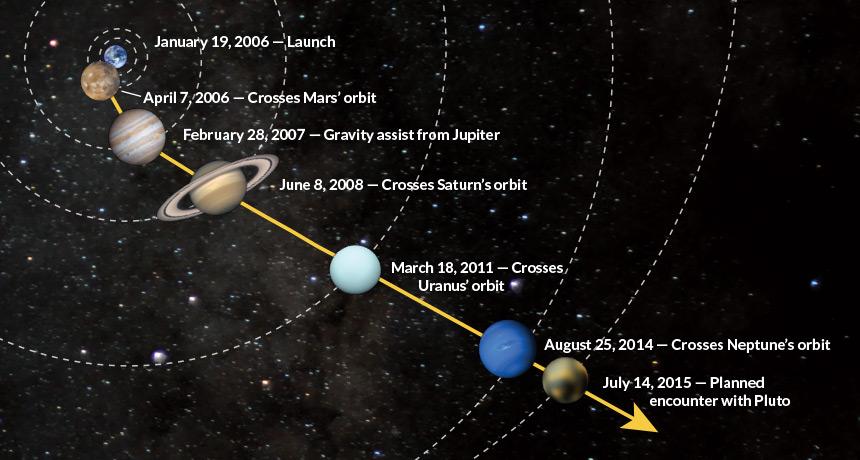
A few days ago this site focused on the Cassini Spacecraft and its mission to the moons of Saturn; but, that is not all that is going on in the far reaches of our own solar system. The “New Horizons” spacecraft is due to reach Pluto in just a few days on July 14th. Pluto, now officially known as a dwarf planet, will have a brief visit from the probe before New Horizons sails past Pluto and out into the cold, barren space beyond. New Horizons launched on January 19, 2006 making it a relatively fast trip to Pluto. It took the spacecraft only 9 hours to cross the orbit of our moon (a journey that used to take three days in the Apollo era) as it traveled at 58,000 kilometers per hour.
Pluto itself still holds much interest for NASA scientists. It is the “final frontier” before spacecraft explore beyond the confines of our neat and tidy system of planets revolving around the star we call our sun. Pluto is an extremely cold world which has been warmed only a little by her star. This means that for 4.5 billion years its surface has remained much the same without the effects of rapid warming and cooling. We will get a glimpse of one variation of what a planet looked like at that time. It is also the largest representative of the many dwarf planets and comets that orbit in the Kuiper belt. Pluto has five known moons that will be visible during the very quick tour.
One might ask why the probe will travel past Pluto so fast? The mission has been called “nearly a decade of boredom capped with hours of terror”1 since the approach will take a matter of hours and the actual transit time across the face of Pluto will last three minutes. New Horizon has been in sleep mode during most of its journey across the solar system with annual “wake-up calls” to check instrumentation. The reason for the fast trip and quick engagement with the dwarf planet is related to the cold. Pluto is headed into the cold portion of its orbit around the sun. It is presently getting further and further away and it takes 248 earth years to make a revolution. As it gets further from our star the atmosphere gets so cold that it may freeze solid forming an icy shell around the planet. This would make it difficult, if not impossible to see the surface of Pluto. New Horizons needed to get there before the year 2020. Once the spacecraft gets there, it is impossible to slow it down. There are no large gravity sources to use for braking. So, for now, NASA must make do with a short flyby and quick cameras.
Sources:
“Rendezvous with Pluto,” Science News 2015-06-12 (viewed on 2015-06-16); https://www.sciencenews.org/article/rendezvous-pluto
“Pluto,” Wikipedia, https://en.wikipedia.org/wiki/Pluto (viewed 2015-06-16)
1 “Rendezvous with Pluto,” Science News 2015-06-12 (viewed on 2015-06-16); https://www.sciencenews.org/article/rendezvous-pluto

Today we celebrate the life of St. Columba who died on this day in 597 C.E.
Saint Columba, or Colm Cille, spread Christianity through what is now known as Scotland. He wrote several Latin poems and hymns, some of which have survived to this day.
Altus Prosator
(Attributed to Colm Cille, also known as Saint Columba; 521-597 Common Era)
High Creator, Unbegotten,
Ancient of Eternal days,
Unbegun ere all beginning,
Him, the world’s one source, we praise:
God who is, and God who shall be :
All that was and is before:
Him with Christ the Sole-Begotten,
And the Spirit we adore,
Co-eternal, one in glory,
Evermore and evermore:—
Not Three Gods are They we worship,
But the Three which are the One,
God, in Three most glorious Persons :—
Other saving Faith is none.
All good angels and archangels,
Powers and Principalities,
Virtues, Thrones, His will created—
Grades and orders of the skies,
That the majesty and goodness
Of the Blessed Trinity
In its ever bounteous largesse
Never might inactive be;
Having thus wherewith to glory,
All the wide world might adore
The high Godhead’s sole-possession
Everywhere and evermore.
— The Hiberno-Latin abecedarian hymn, Altus prosator, a sequence attributed to St. Columba, from Lays of Iona and Other Poems; English translation by Samuel John Stone.
http://www.eccentricbliss.com/2014/03/altus-prosator/
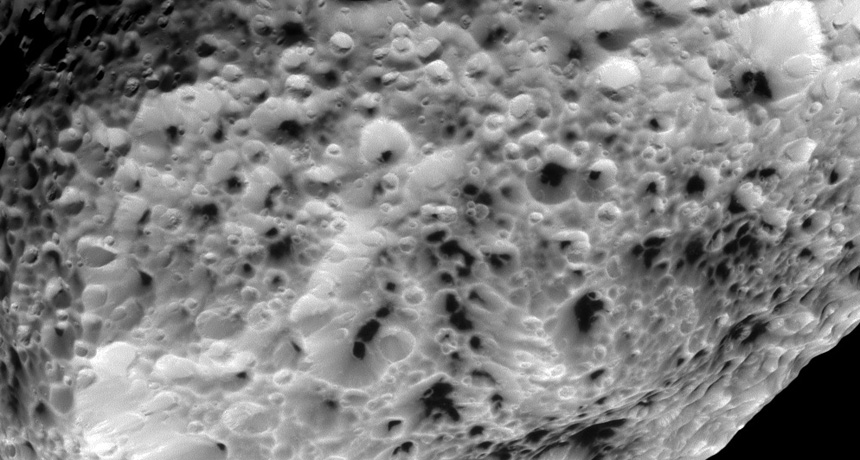
The Cassini spacecraft recently completed a close flyby of Hyperion, one of the moons of Saturn, and sent back some amazing pictures. Hyperion is certainly one of the more odd shaped moons in our solar system. Whereas people used to think Earth’s moon was made of cheese, Hyperion truly looks like Swiss cheese. The surface and interior of the moon are filled with pores and tunnels giving it the appearance of a sponge. In fact, much of the planet is made of water ice with very little solid rock. There are so many holes in the moon that if you could find a pool of water large enough, say our own Atlantic Ocean, the moon would float with about half of its bulk sticking out of the water. Hyperion is known to have an erratic rotation. It wobbles on its own axis and its orbit about the planet is eccentric and highly influenced by its proximity to Titan, Saturn’s largest moon.
The Cassini robotic spacecraft itself has had an amazingly successful mission in space. Originally launched in October of 1997, the spacecraft is now in its second mission extension which will see it perform active scientific observations through 2017. On its way to Saturn, Cassini flew past Venus and Jupiter, relaying information on each of those planets before achieving orbit around Saturn in July of 2004. In December of 2004, Cassini released the Huygens probe which successfully landed on the surface of Titan, sending back 350 pictures of this large moon. This latest flyby of Hyperion is the last for that moon. Now Cassini sets its sites on other moons in the Saturnian system. In 10 days Cassini will fly past Dione and send back images of that moon. Today, she is in position to get a good look at Enceladus and the outer rings of Saturn (see the image below).
We live in a time when it is possible to learn much from the exploration of our solar system. I am thankful for the scientists and technicians at NASA’s Jet Propulsion Laboratory that use their imaginations to design and execute such amazing missions to the outer reaches of our solar system.
Works cited:
Cassini–Huygens in Wikipedia, http://en.wikipedia.org/wiki/Cassini%E2%80%93Huygens
Hyperion (moon) in Wikipedia, http://en.wikipedia.org/wiki/Hyperion_(moon)
NASA, Jet Propulsion Laboratory, Saturn, Cassini, http://saturn.jpl.nasa.gov/
Science News, “Cassini gets last look at Saturn’s spongy satellite Hyperion,” 2015-06-04, https://www.sciencenews.org/blog/science-ticker/cassini-gets-last-look-saturn%E2%80%99s-spongy-satellite-hyperion?tgt=nr
You can click on these images for a larger view.
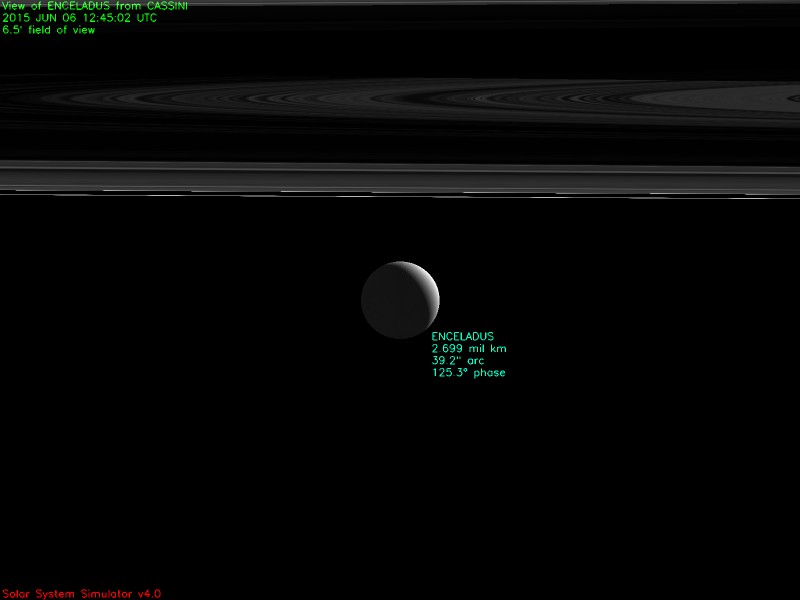
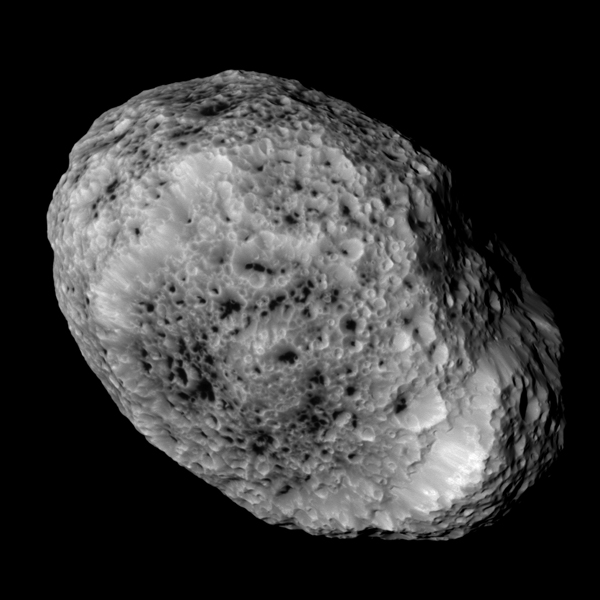
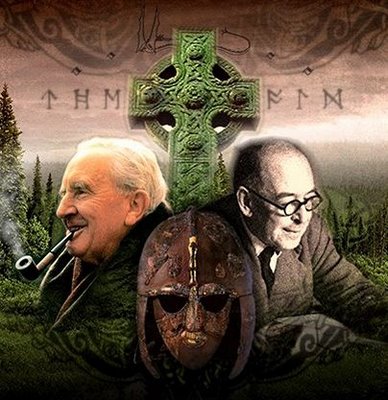 1
1Whereas C S Lewis tries to make us comfortable in what we already believe by dressing up the story as a children’s masquerade, Tolkien makes us profoundly uncomfortable. Our people, our culture, our language, our toehold upon this shifting and uncertain Earth are no more secure than those of a thousand extinct tribes of the Dark Ages; and a greater hope than that of the work of our hands and the hone of our swords must avail us.2
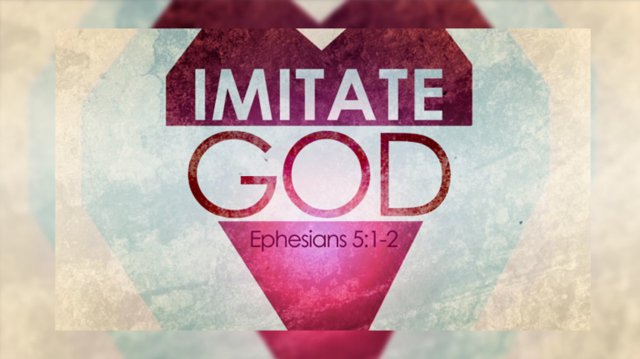
I have been slow-reading Ephesians 5 for a few days. There is a wealth of material packed into one chapter of this letter to the ancient church at Ephesus. The letter was written in the first century of the Common Era, most likely around the year 62 and most likely by the Apostle Paul. The first striking concept appears in verse one: “Imitate God, therefore, in everything you do.” That sets the bar particularly high. How does one imitate the Creator and Sustainer of the universe? The answer is found in verse two: “Live a life filled with love, following the example of Christ.” His example is further spelled out in that same verse: “He [that is Christ] loved us and offered himself as a sacrifice for us, a pleasing aroma to God.”
These two verses set the stage for the rest of the chapter; a chapter that is filled with much practical advice on the ways in which we “imitate God.” It is important to pause on the first two verses and allow them to speak into the rest of the teaching. If we fail to grasp the importance of the words, “live a life filled with love” we will certainly misunderstand and misappropriate the rest of the chapter.
The practical advice of the chapter includes warnings about avoiding greed, sexual immorality, and evil intentions. It also speaks to the nature of marriage relationships. Many have read this chapter without continually referring back to the first two verses. They question what gives Paul, a single man, the right to speak about sexuality and the marriage relationship. Many have characterized Paul as prudish and lacking an appreciation for sexuality in its broadest sense. Many might suggest that the Apostle Paul should, like Pierre Elliott Trudeau once said about the Canadian government, “get out of the bedrooms of the people?”1
But, if we constantly keep in mind that imitating God means to “live a life filled with love, following the example of Christ,” we will have a better understanding of what it is that God is communicating through the Apostle Paul. Our sexual relationships, like the rest of our lives, must be filled with love. Sexual immorality is anything that takes sex and turns it into something it is not meant to be. God designed sexuality to be a self-giving and generous action. When greed and fulfillment of our own impulses become primary, sexual intimacy has been tainted and quickly becomes something other than that which it was intended to be. Sex is about giving ourselves to another and about cooperating with another person for the purposes of creating new life.
At first glance, the last sentence of the previous paragraph may not sound controversial; but in emphasizing both the “giving of ourselves” and the “cooperation with another person for the purposes of creating new life,” I am taking a stance that is not often underscored in Evangelical Church conversations. As one writer has recently said,
“marriage, in scripture and the Christian tradition, has never merely been about love; it’s about faithful love and new life.”2
“to become one-flesh with one’s spouse is to coordinate biologically with an other for the common purpose of bringing about new life.”3
It is this proper understanding of the place of sexuality in our lives that is most lacking in our Western World today; and Ephesians 5 has the capacity to reorient the discussion. Would it not be revolutionary if we once again captured the idea that sexual intimacy is about “imitating God,” “living a life of love,” and “offering” ourselves in a generous and “sacrificial” manner? The writer further summarizes in his paper,
“We were created from the beginning – male and female – for faithful love and new life: this is the meaning of our sexuality. But our sexuality is not absolute; it is a sign of the divine being-in-relation and of the Father’s plan from the beginning to unite his creation to himself.”4
In this post, I will not take the time to fully address the last sentence of the quote. I will merely introduce the concept that “our sexuality is not absolute” and remind us that it points to something greater. Perhaps that can be the topic of another post. For now, I leave you with the text of Ephesians 5 and encourage all to meditate on the words “live a life of love” as we slowly read this ancient text.
Ephesians 5:1-33 (New Living Translation)
1 Imitate God, therefore, in everything you do, because you are his dear children. 2 Live a life filled with love, following the example of Christ. He loved us and offered himself as a sacrifice for us, a pleasing aroma to God.
3 Let there be no sexual immorality, impurity, or greed among you. Such sins have no place among God’s people. 4 Obscene stories, foolish talk, and coarse jokes—these are not for you. Instead, let there be thankfulness to God. 5 You can be sure that no immoral, impure, or greedy person will inherit the Kingdom of Christ and of God. For a greedy person is an idolater, worshiping the things of this world.
6 Don’t be fooled by those who try to excuse these sins, for the anger of God will fall on all who disobey him. 7 Don’t participate in the things these people do. 8 For once you were full of darkness, but now you have light from the Lord. So live as people of light! 9 For this light within you produces only what is good and right and true.
10 Carefully determine what pleases the Lord. 11 Take no part in the worthless deeds of evil and darkness; instead, expose them. 12 It is shameful even to talk about the things that ungodly people do in secret. 13 But their evil intentions will be exposed when the light shines on them, 14 for the light makes everything visible. This is why it is said,
“Awake, O sleeper,
rise up from the dead,
and Christ will give you light.”
15 So be careful how you live. Don’t live like fools, but like those who are wise. 16 Make the most of every opportunity in these evil days. 17 Don’t act thoughtlessly, but understand what the Lord wants you to do. 18 Don’t be drunk with wine, because that will ruin your life. Instead, be filled with the Holy Spirit, 19 singing psalms and hymns and spiritual songs among yourselves, and making music to the Lord in your hearts. 20 And give thanks for everything to God the Father in the name of our Lord Jesus Christ.21 And further, submit to one another out of reverence for Christ.
22 For wives, this means submit to your husbands as to the Lord. 23 For a husband is the head of his wife as Christ is the head of the church. He is the Savior of his body, the church. 24 As the church submits to Christ, so you wives should submit to your husbands in everything.
25 For husbands, this means love your wives, just as Christ loved the church. He gave up his life for her 26 to make her holy and clean, washed by the cleansing of God’s word. 27 He did this to present her to himself as a glorious church without a spot or wrinkle or any other blemish. Instead, she will be holy and without fault. 28 In the same way, husbands ought to love their wives as they love their own bodies. For a man who loves his wife actually shows love for himself.29 No one hates his own body but feeds and cares for it, just as Christ cares for the church. 30 And we are members of his body.
31 As the Scriptures say, “A man leaves his father and mother and is joined to his wife, and the two are united into one.” 32 This is a great mystery, but it is an illustration of the way Christ and the church are one. 33 So again I say, each man must love his wife as he loves himself, and the wife must respect her husband.
1 “Omnibus Bill: ‘There’s no place for the state in the bedrooms of the nation'”. CBC News (Toronto: CBC Digital Archives). 1967-12-21. Archived from the original on 2012-08-12. Retrieved 2012-08-12 and 2015-05-25.
2 Private communication.
3 Ibid.
4 Ibid.

“How we spend our days is, of course, how we spend our lives.” – Annie Dillard, The Writing Life
“How we spend our days is, of course, how we spend our lives; and how we spend our lives, of course, determines the person we become.” – Keith Shields, Thirst
If I spend my days writing, I will become a writer. If I spend my days leading, I will become a leader. If I spend my days painting, I will become a painter. If I spend my days wasting time on frivolous pursuits, I will become a waster of time.
At a certain point in my life I dreamed of becoming a traveling singer-songwriter who made his living as an entertainer. I spent some time writing songs, singing, and even entertaining. Yet, I spent much more time working as a Lab Scientist in a Molecular Diagnostic Lab, studying theology at Regent College, being a father to my children, and being a husband to my wife. In that time, I became a Lab Scientist, a student, a father, and a husband (occasionally I got the order of these wrong). I did not become a professional entertainer. How we spend our days is, of course, how we spend our lives; and how we spend our lives, of course, determines the person we become.
Today is the day to take a one or two hour meditative break. Get away to a quiet place, alone with your thoughts, and make some decisions about how you want to spend your days, how you want to spend your life, and the person you want to become. One or two hours may not be enough. Perhaps you will need to take two or three days away at a retreat centre in quiet meditation, deep thinking, and active listening to your mind and spirit. Retreats of this nature work best when guided by the ancient words of scripture and the companioning words of others who have been in a similar place. Annie Dillard spent a full year in quiet contemplation on the banks of Tinker Creek, meditating, exploring, and writing about what she saw. In the process, she became an influential writer and penned Pilgrim at Tinker Creek.
Who will you become? Time moves on at a constant pace; but feels ever more rapid. The way we spend our hours, will be the way we spend our days, will be the way we spend our lives, and will determine who we are. Will we be unintentional or intentional about the person we become?
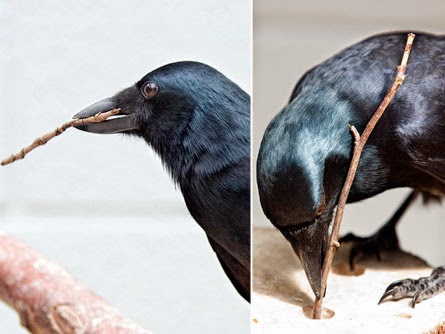
Those who regularly read this blog will know that I have a fascination with crows. I have repeatedly sung their praises as one of the most intelligent animals on the planet (see here; here; and here). So, when I read another paper about crows and tool use, I naturally wanted to write about it here.
The results of a study published in the journal, Proceedings of the Royal Society B1, show that not only do New Caledonian Crows use tools, but they also store them for future use. Crows who use sticks to extract food out of holes in the ground or holes in trees will sometimes set the stick aside in a safe place to ensure that the tool is available for the next time it is needed. The authors suggest that the birds are being protective of their tools. We might compare this to the way some humans protect and organize tools in their garage.
While reading this paper I followed some of their references and was surprised to find another paper that referred to a number of aquatic species that use tools. I did not know that there were so many animals capable of tool usage. There are species of dolphins that “wear sponges for protection during foraging;” sea otters that use kelp as a net to trap prey; other sea otters that use rocks as hammers to open shells; and hermit crabs that “carry anemones for protection from predators.”2 It seems that tool usage is a well-documented phenomenon in a number of species. I look forward to better understanding this behavior in the future as we continue to be surprised by the world in which we live.
1 Context-dependent ‘safekeeping’ of foraging tools in New Caledonian crows
Barbara C. Klump, Jessica E. M. van der Wal, James J. H. St Clair, Christian Rutz; Proceedings of the Royal Society B; June 2015; Volume: 282 Issue: 1808; DOI: 10.1098/rspb.2015.0278 Published 20 May 2015
2 Tool use by aquatic animals; Janet Mann, Eric M. Patterson; Proceedings of the Royal Society B; November 2013 Volume: 368 Issue: 1630; DOI: 10.1098/rstb.2012.0424 Published 7 October 2013

The popular press has, in recent years, written much about the planet Mars, but very little about Venus. This is to be expected since Mars is the planet of greatest focus for the major space programs of the world. Four planetary rovers have traversed various portions of the Martian surface,1 orbital spacecraft have mapped the surface in great detail, and visionary pioneers have made it their goal to put colonies of humans on Mars.
Yet we should not so quickly ignore the beauty and mystery of Venus. Certainly it would be much more difficult to colonize; yet, as a destination for research and exploration, it is still intriguing. Venus has been compared to our own Earth in a number of ways. Venus has a radius of 6,052 km while Earth has a radius of 6,371 km. Venus has a mass that is 81% of that of Earth. Both are relatively close to our sun. Venus, on average is 108 million km from the sun, while Earth averages 150 million km.2 At their closest, Earth and Venus are only 26 million km apart. Compare this to Earth and Mars that are 34 million km apart at their closest. Due to the elliptical orbits of all three planets, these distances vary widely and there are moments when Earth is closer to Mars than to Venus.3
So, why would it be more difficult to colonize Venus? The answer lies in the thick atmosphere of the planet. Most people recognize that the earth has a greenhouse gas problem, but Venus is the queen of carbon dioxide. Her atmosphere – and yes, the planet has been referred to as feminine ever since it was named after the Greek goddess of beauty – is 96% CO2 and the atmospheric pressure on the surface is 92 times that of our own atmosphere at sea level. That is equivalent to the pressures experienced at a depth of 3000 ft in our own ocean. Spacesuits would not be sufficient to the task; we would need a submarine or bathysphere to be comfortable on the Venetian soil. Even space vehicles built to contemporary standards would be crushed on the surface of this planet. Then there is the heat; the average temperature on Venus is 460 degrees Celsius. For comparison, the average temperature on Earth is 14 degrees, on Mars it is minus 55 degrees, and on Mercury it is 167 degrees Celsius. Venus is our solar system’s hottest planet. All water has long since boiled away and humans would need a lot of air-conditioning to last any length of time on the surface.
Airship colonization has been suggested as one possible way to live on Venus.4 Thirty miles above the surface, the air pressure is one Earth atmosphere. Thus, lighter-than-air balloons might function as research vessels on this planet. Such machines would still need to be well insulated against heat and impervious to high concentrations of sulphuric acid that probably exist at this level in the Venetian atmosphere.5 With a Venetian axis rotation that lasts 243 Earth days, a counter-clockwise rotation around its axis (Uranus is the only other planet in our solar system with a retrograde rotation), a day relative to the sun that is 117 Earth days long, and no moon, it would be a fascinating place to live.6
1. http://en.wikipedia.org/wiki/Mars_rover
2. http://www.esa.int/Our_Activities/Space_Science/Venus_Express/Venus_compared_to_Earth
3. http://en.wikipedia.org/wiki/Venus
4. http://qz.com/317243/nasa-scientists-want-to-colonize-venus-with-giant-floating-cities/
5. http://www.esa.int/Our_Activities/Space_Science/Venus_Express/Acid_clouds_and_lightning
6. http://en.wikipedia.org/wiki/Venus
In the Light
Written by Charlie Peacock; as Performed by DC Talk
1 John 1:5-7
(Listen while you read)
I keep trying to find a life
On my own, apart from You
I am the king of excuses
I’ve got one for every selfish thing I do
What’s going on inside of me?
I despise my own behavior
This only serves to confirm my suspicions
That I’m still a man in need of a Savior
I wanna be in the Light
As You are in the Light
I wanna shine like the stars in the heavens
Oh, Lord be my Light and be my salvation
Cause all I want is to be in the Light
All I want is to be in the Light
The disease of self runs through my blood
It’s a cancer fatal to my soul
Every attempt on my behalf has failed
To bring this sickness under control
Tell me, what’s going on inside of me?
I despise my own behavior
This only serves to confirm my suspicions
That I’m still a man in need of a Savior
I wanna be in the Light
As You are in the Light
I wanna shine like the stars in the heavens
Oh, Lord be my Light and be my salvation
Cause all I want is to be in the Light
All I want is to be in the Light
Honesty becomes me
(There’s nothing left to lose)
The secrets that did run me
(In Your presence are defused)
Pride has no position
(And riches have no worth)
The fame that once did cover me
(Has been sentenced to this Earth)
Has been sentenced to this Earth
Tell me, what’s going on inside of me?
I despise my own behavior
This only serves to confirm my suspicions
That I’m still a man in need of a Savior
I wanna be in the Light
As You are in the Light
I wanna shine like the stars in the heavens
Oh, Lord be my Light and be my salvation
Cause all I want is to be in the Light
All I want is to be in the Light
I wanna be in the Light
As You are in the Light
I wanna shine like the stars in the heavens
Oh, Lord be my Light and be my salvation
Cause all I want is to be in the Light
All I want is to be in the Light
(There’s no other place that I want to be)
(No other place that I can see)
(A place to be that’s just right)
(Someday I’m gonna be in the Light)
(You are in the Light)
(That’s where I need to be)
(That’s right where I need to be)
This is the message we have heard from him and declare to you: God is light; in him there is no darkness at all. If we claim to have fellowship with him and yet walk in the darkness, we lie and do not live out the truth. But if we walk in the light, as he is in the light, we have fellowship with one another, and the blood of Jesus, his Son, purifies us from all sin. – 1 John 1:5-7
What does this passage mean when it uses the words “walk in the light?” Light reveals things and allows them to be seen. Darkness hides; but light reveals. So if we walk in the light we are walking in such a way that our lives are being revealed. When we walk in the dark, we hide things. Walking in the light is about being honest with others. It is about finding someone with whom to be honest when we sin. It is being honest and admitting that we commit sins and are fallen broken people still progressing in a journey of holiness.
Randy Stonehill seems to understand the danger of sins that are hidden in the dark. Listen to the words of his song, “Under the Rug.”
Under The Rug
Lyrics and Music by Randy Stonehill from the album The Lazarus Heart
(Listen here)
I have a secret I can’t tell, and I’ve learned to conceal it well,
Under the rug.I have a secret I can’t tell, and I’ve learned to conceal it well,
Ah, but this disturbing smell keeps coming from the carpet, (under the rug)
That’s where the old ghosts hide away, down in the darkness and decay,
I work so hard to make them stay down beneath the floorboards. (under the rug)Oh, I needed the perfect plan, but it’s all gotten out of hand,
I keep my head in the sand now,
It’s so scary under the rug.“Bury your sins and they won’t survive,” I told myself ’til the big surprise,
Down in the dirt is where they thrive, like little poison toadstools,
Under the rug,It’s the thing in Pandora’s box, biting through all the chains and locks,
Now the whole house is rocking,
It’s so scary under the rug, (so scary)
It’s so hairy under the rug, (under the rug)
It’s so scary under the rug.Oh, skeletons dance, and I fear they might rattle their bones in the broad daylight,
Oh, yeah.So I wear a poker face; I close all the curtains just in case,
But something lurks in the crawling space, pointing bony fingers, (under the rug)
I hear the ticking of my telltale heart, like a bomb set to blow my world apart,
I wish that guilt would make us smart, but I’m sweeping all this garbage…I have a secret I can’t tell, and I’ve learned to conceal it well,
Under the rug.
We each must ask, “Am I walking in the light and revealing my life to others or am I still keeping some things hidden in the dark?” Sins that are allowed to sit in dark corners will incubate and grow. Those exposed to the light lose their ability to harm us and harm others. Each of us needs one person or a few people to whom we truly reveal ourselves. Then we will be walking in the light “as He is in the light.”
